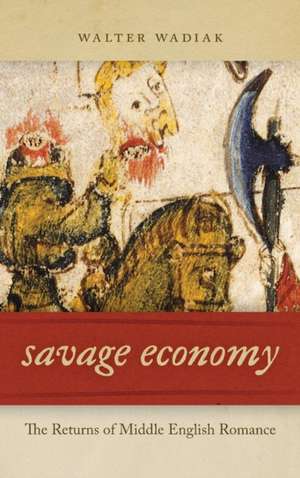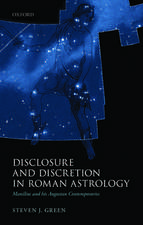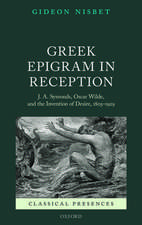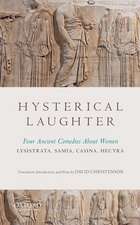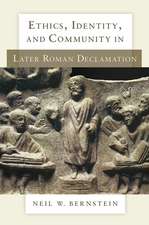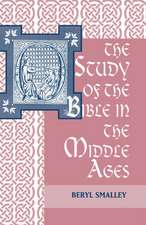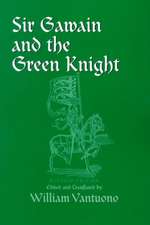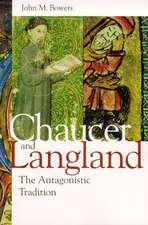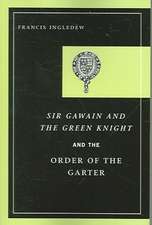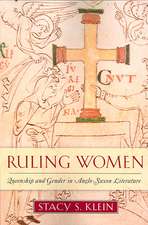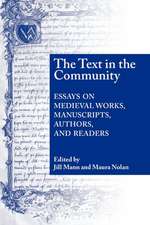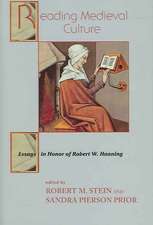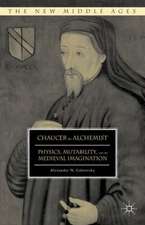Savage Economy – The Returns of Middle English Romance
Autor Walter Wadiaken Limba Engleză Hardback – 19 dec 2016
In Savage Economy: The Returns of Middle English Romance, Walter Wadiak traces the evolution of the medieval English romance from its thirteenth-century origins to 1500, and from a genre that affirmed aristocratic identity to one that appealed more broadly to an array of late medieval communities. Essential to this literary evolution is the concept and practice of “noble” gift-giving, which binds together knights and commoners in ways that both echo and displace the notorious violence of many of these stories.
Wadiak begins with the assumption that “romance” names a particular kind of chivalric fantasy to which violence is central, just as violence was instrumental to the formation and identity of the medieval warrior aristocracy. A traditional view is that the violence of romance stories is an expression of aristocratic privilege wielded by a military caste in its relations with one another as well as with those lower on the social scale. In this sense, violence is the aristocratic gift that underwrites and reaffirms the feudal power of a privileged group, with the noble gift performing the symbolic violence on which romance depends in order to present itself as both a coded threat and an expression of chivalric values. Well-known examples of romance in Middle English, such as Sir Gawain and the Green Knight and Chaucer’s Knight’s Tale, are considered alongside more “popular” examples of the genre to demonstrate a surprising continuity of function across a range of social contexts. Wadiak charts a trajectory from violence aimed directly at securing feudal domination to the subtler and more diffuse modes of coercion that later English romances explore. Ultimately, this is a book about the ways in which romance lives on as an idea, even as the genre itself begins to lose ground at the close of the Middle Ages.
"With his Savage Economy: The Returns of Middle English Romance, Walter Wadiak delivers a dynamically written and intellectually sparkling study of medieval romance. Treating his materials with deftness, acuity, and theoretical sophistication, he engages the medieval texts with penetrating uses of theory in a way that will stimulate a number of important advances in work on medieval 'romance' and 'ballad' and, no doubt, medieval literature generally." --Andrew Galloway, Cornell University
Wadiak begins with the assumption that “romance” names a particular kind of chivalric fantasy to which violence is central, just as violence was instrumental to the formation and identity of the medieval warrior aristocracy. A traditional view is that the violence of romance stories is an expression of aristocratic privilege wielded by a military caste in its relations with one another as well as with those lower on the social scale. In this sense, violence is the aristocratic gift that underwrites and reaffirms the feudal power of a privileged group, with the noble gift performing the symbolic violence on which romance depends in order to present itself as both a coded threat and an expression of chivalric values. Well-known examples of romance in Middle English, such as Sir Gawain and the Green Knight and Chaucer’s Knight’s Tale, are considered alongside more “popular” examples of the genre to demonstrate a surprising continuity of function across a range of social contexts. Wadiak charts a trajectory from violence aimed directly at securing feudal domination to the subtler and more diffuse modes of coercion that later English romances explore. Ultimately, this is a book about the ways in which romance lives on as an idea, even as the genre itself begins to lose ground at the close of the Middle Ages.
"With his Savage Economy: The Returns of Middle English Romance, Walter Wadiak delivers a dynamically written and intellectually sparkling study of medieval romance. Treating his materials with deftness, acuity, and theoretical sophistication, he engages the medieval texts with penetrating uses of theory in a way that will stimulate a number of important advances in work on medieval 'romance' and 'ballad' and, no doubt, medieval literature generally." --Andrew Galloway, Cornell University
Preț: 324.49 lei
Nou
Puncte Express: 487
Preț estimativ în valută:
62.10€ • 64.59$ • 51.27£
62.10€ • 64.59$ • 51.27£
Carte tipărită la comandă
Livrare economică 15-29 aprilie
Preluare comenzi: 021 569.72.76
Specificații
ISBN-13: 9780268101183
ISBN-10: 0268101183
Pagini: 210
Dimensiuni: 152 x 229 x 16 mm
Greutate: 0.48 kg
Ediția:1
Editura: MR – University of Notre Dame Press
ISBN-10: 0268101183
Pagini: 210
Dimensiuni: 152 x 229 x 16 mm
Greutate: 0.48 kg
Ediția:1
Editura: MR – University of Notre Dame Press
Recenzii
"With his Savage Economy: The Returns of Middle English Romance, Walter Wadiak delivers a dynamically written and intellectually sparkling study of medieval romance. Treating his materials with deftness, acuity, and theoretical sophistication, he engages the medieval texts with penetrating uses of theory in a way that will stimulate a number of important advances in work on medieval 'romance' and 'ballad' and, no doubt, medieval literature generally." —Andrew Galloway, Cornell University
"Savage Economy offers a timely history of romance’s interwoven belatedness and modernity. Resisting the view of medieval romance as ideological fantasy, Walter Wadiak shows the violent cultural work it performs through the gifts that are offered. In its exposure of the aggressivity of the chivalric gift economy, this book offers its readers an incredible gift of its own." —Elizabeth Scala, University of Texas at Austin
"Walter Wadiak’s subtly audacious gambit in Savage Economy is to use the retroactive logic of romance, a genre built upon the promise of a good return, as a master code for reading romance anew. Just as a cause can only be understood backwards, through its effects, so too can we understand what romance always was only through a sustained engagement with its supposedly depreciated Middle English iterations. In the outlawry of the Gest of Robyn Hode or the reckless expenditures of fourteenth-century spendthrift romances, we encounter, both as persistent return and as the nostalgic longing to return, the ideological underpinnings that romance otherwise works to repress. Most audaciously retroactive of all, perhaps, the book manages to rehabilitate the gift as a theoretical concept equal to the commodity fetish for helping demystify the workings of a capitalism that remains indebted to, and invested in, the distinctive violence of chivalry. The returns of Savage Economy are, like those of romance, manifold, accumulative, surprising." —George Edmondson, Dartmouth College
Notă biografică
Walter Wadiak is assistant professor of English at Nanyang Technological University, Singapore.
